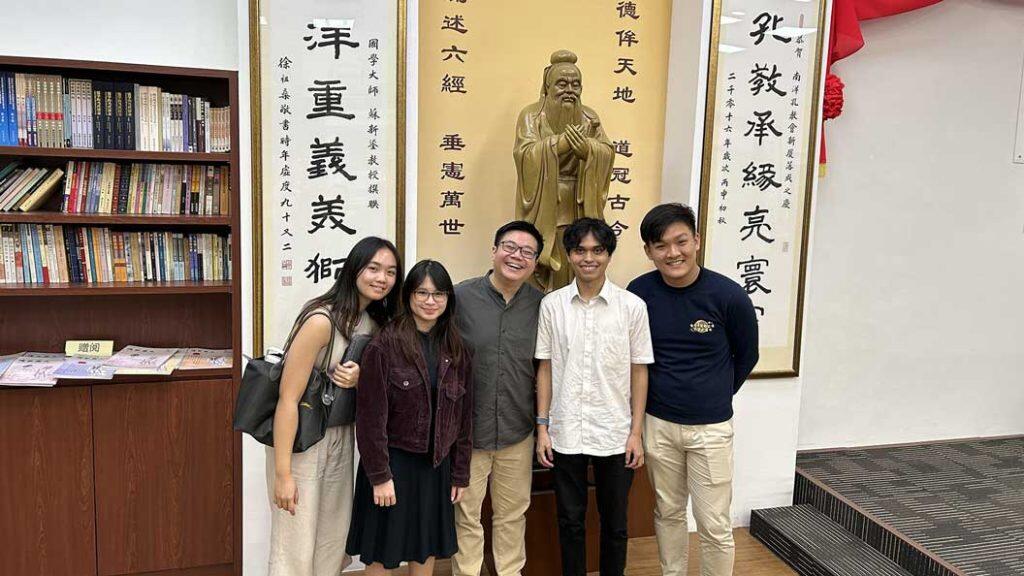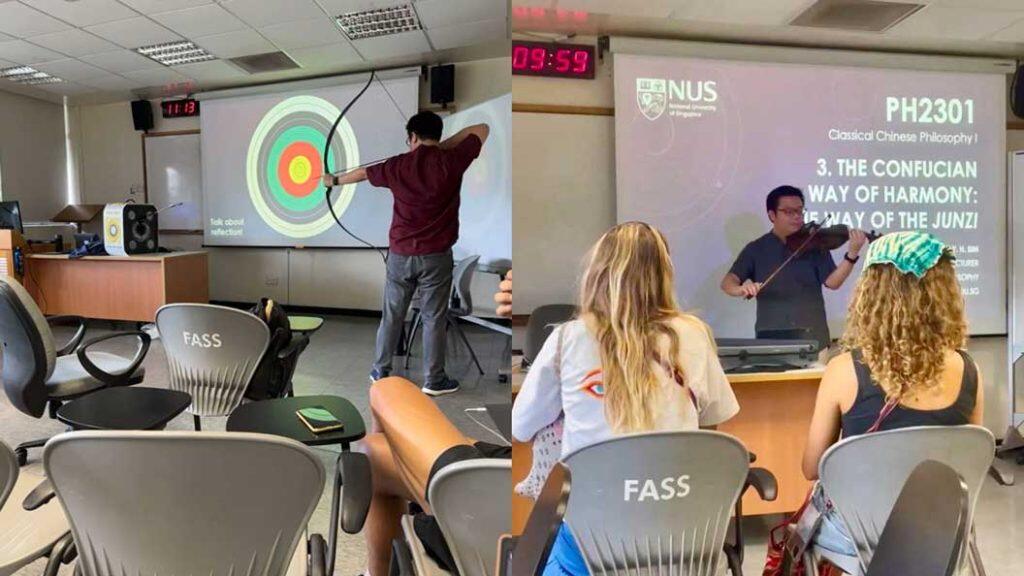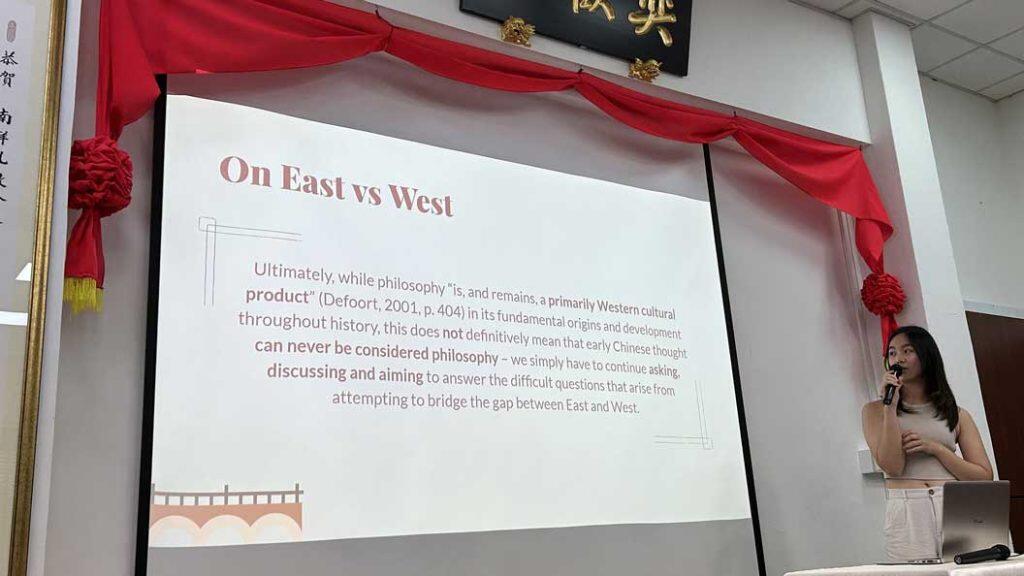

Any attempt to understand Chinese philosophy – an intellectual tradition that spans four thousand years – can be a daunting task for the average person. More so for those who jiak kantang – a colloquial term for Singaporeans who grew up with predominantly Western influence – or those unfamiliar with the Chinese language and culture, observes NUS philosophy lecturer Mr Jonathan Sim. According to him, it was a desire to open up the study of the tradition to a broader swathe of students that motivated the NUS Department of Philosophy to offer a course on classical Chinese philosophy in English since the 1990s.
The NUS alumnus recounted, “I grew up speaking mostly English and struggled with Chinese, but I was able to learn Chinese philosophy as a student 10 years ago thanks to professors who were passionate about teaching it in English then.”
Fast forward to 2022, when Mr Sim jumped at the chance to pay it forward with a group of students who were keen on learning Confucianism in English, through a summer course birthed from NUS’ Design-Your-Own-Course programme.
He said, “I was inspired by the students’ interest and enthusiasm to learn more about Chinese philosophy and its influence on the modern world, particularly on modern Singapore’s culture and policies, that when the opportunity arose for me to teach a course titled Classical Chinese Philosophy I, I took it without hesitation!”
Offered in the first semester of every academic year (AY), PH2301 Classical Chinese Philosophy I (PH2301) delves into the ethics and politics of the great Chinese philosophers such as Confucius, Mozi, Yang Zhu, Mencius and Laozi.
The course is not as common as one might expect noted Mr Sim, given that Chinese philosophy is taught in many universities as part of sinology, history, religion and comparative literature – these disciplines place a stronger emphasis on the cultural, social and historical context in which these philosophies developed..
“NUS is one of the few universities in the world offering Chinese philosophy in English using the tools and methods of modern philosophy to study the evolution of concepts and ideas, and how these ideas contrast or align with our modern philosophical understanding of the world.”
Innovative ways of teaching students Chinese philosophy in English


Aware that the biggest struggle students would have with Chinese philosophy is with the ancient texts (even in English) that are unlike modern philosophy papers, Mr Sim devises creative ways to make them more accessible. He dedicates a special lecture to teaching students how to understand the texts and writes guides as part of the weekly preparation exercise to give them tips on how to tackle the challenges they encounter. The etymology of Chinese words is also discussed in class to give students a deeper understanding of the concepts taught.
To help students gain clarity on the different philosophical concepts involved in deciding the right course of action in a difficult situation, the innovative lecturer invites students to role-play as Confucius and Laozi on Reddit to give life advice to people online.
Props are also used to help the lessons come alive. Mr Sim has played his violin to illustrate the concept of harmony, brought an archery longbow to class to demonstrate the connection between archery and morality in Confucian thought, and even demonstrated certain kungfu moves to showcase the connection between certain ideas in Chinese philosophy and martial arts.
On his unconventional teaching methods, Mr Sim explained, “I want to empower students to search for insights to address contemporary problems and guide them to build confidence in their interpretations of the ancient thinkers and adapt these ideas to address modern problems in our personal and professional lives.”
Reaching out to the broader community about learning Chinese philosophy in English


At Mr Sim’s encouragement, four of the top-performing course students from AY2022/2023 also presented their final course essays at the Nanyang Confucian Association (NCA) recently as a way to share their passion for, and generate awareness of, the learning of Chinese philosophy in the English language to the wider community.
These students – Joan Lim, Denovan Abas, Lai Jia Jia and Chen Zeyuan – also received the Kongzi Culture Fund: Mah Lan Ying Confuscianism Scholarship at an NCA ceremony in recognition of their excellent performance in the course.
Feedback from them on the course has also been nothing short of positive.
Lai Jia Jia, a second-year student at the NUS Faculty of Arts and Social Sciences, shared that it was interesting to see Confucian values embedded in the historical development of Singapore. She pointed to values such as hard work, loyalty, propriety and harmony as among several virtues espoused by Confucius that were key to Singapore’s governance and subsequent prosperity in its early years.
“It prompted me to reflect on how these virtues play a role in my daily life and how they have come to frame Singaporean society today,” she reflected.
Denovan Abas, a fourth-year student majoring in Philosophy, Politics and Economics, added, “As a non-Chinese, I don’t have any cultural background that imparts even a little bit of the teachings of the classical Chinese thinkers, so I really came in with a completely blank slate. The course gave a really good introduction into various classical Chinese thinkers and what their main contributions are, and by the end I was able to understand and even think critically of the various viewpoints made by these Chinese thinkers.”
Students who are keen to pursue even more knowledge and appreciation for ancient Chinese thinkers and their wisdom can look forward to a new “Classical Chinese Philosophy II” (PH3301) course from the next academic year. Building on the first part of the course, this second part will examine Zhuangzi, Xunzi, Han Feizi and other remarkable figures in the canon of Chinese philosophers.
As a former student and now a lecturer, Mr Sim sees these courses as an important personal mission to make the learning of Chinese thought and culture more accessible to anyone who has an interest in learning.
“This also dispels the misperception that one has to be good in Mandarin to understand Chinese philosophy. Hopefully, I can inspire others to be just as excited and passionate about learning Chinese philosophy, the same way my professors had inspired my passion.”







































